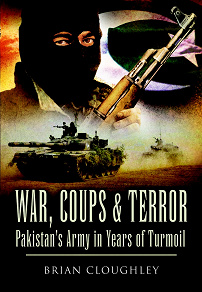E-bok
War, Coups & Terror
In recent years Pakistan has changed from being a state of regional strategic significance to one of major global importance. Its geographical position and delicate religious and tribal mix, coupled with a complex political structure, have ensured that its actions - and inactions - have attracted close scrutiny since 9/11 and the declaration of the 'War on Terror'.
Yet there remains widespread disagreement among political and military analysts as to the real position of this enigmatic nation. What is not in dispute is the importance of the Pakistani Army whose backing was crucial to President Musharraf's rule, as it was to his military predecessors. With restoration of civilian governance in 2008 the army remains no less important in the affairs of the nation.
The author has been closely acquainted with the Pakistani military for some thirty years. is links with its past and present senior officers have given him a unique insight into its operations and its controversial role within government. While making the Army's position clear, Cloughley is at pains to be objective. For example he is critical of Musharraf's 1999 invasion of the Kargil Sector of the Line of Control. This and similar instances of objectivity and even-handedness, which may not be welcomed in all quarters, gives this work its credibility.
Operations against the 2003-2004 tribal uprising are described for the first time and benefit from access to the Corps Commander's diary of the period and from further detailed information in 2006-2008.
With its coverage of military-political relations since Zulfiqar Ali Bhutto came to power in 1971, this book, the first major study of the Pakistan Army for many years, will be welcomed by all those seeking a closer understanding of this enigmatic and complex country, its ambitions, affiliations and loyalties. While its content and conclusions will inevitably be contentious there is no disputing the topicality and importance of War, Coups and Terror.
Yet there remains widespread disagreement among political and military analysts as to the real position of this enigmatic nation. What is not in dispute is the importance of the Pakistani Army whose backing was crucial to President Musharraf's rule, as it was to his military predecessors. With restoration of civilian governance in 2008 the army remains no less important in the affairs of the nation.
The author has been closely acquainted with the Pakistani military for some thirty years. is links with its past and present senior officers have given him a unique insight into its operations and its controversial role within government. While making the Army's position clear, Cloughley is at pains to be objective. For example he is critical of Musharraf's 1999 invasion of the Kargil Sector of the Line of Control. This and similar instances of objectivity and even-handedness, which may not be welcomed in all quarters, gives this work its credibility.
Operations against the 2003-2004 tribal uprising are described for the first time and benefit from access to the Corps Commander's diary of the period and from further detailed information in 2006-2008.
With its coverage of military-political relations since Zulfiqar Ali Bhutto came to power in 1971, this book, the first major study of the Pakistan Army for many years, will be welcomed by all those seeking a closer understanding of this enigmatic and complex country, its ambitions, affiliations and loyalties. While its content and conclusions will inevitably be contentious there is no disputing the topicality and importance of War, Coups and Terror.
Logga in för att låna
Information
Stöds av följande plattformar
PC/Mac
Surfplatta Läsplatta
Smartphone

